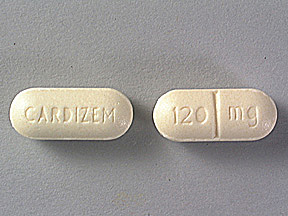
Cardizem Coupons & Savings Card – Discount Prices from $23.74
Brand for: Diltiazem hcl
My prescription
Edit
120MG, Diltiazem Hcl (90 Tablets)
Select pharmacy

CVS
$36.00
COUPON PRICE
Albertsons
$23.74
COUPON PRICE
Walgreens
$29.88
COUPON PRICE
Walmart
$56.69
COUPON PRICECardizem savings card
Show this card to your pharmacist
Albertsons
$23.74
BIN
ID
PCN
GRP
019876
LHCCD832A7
CHIPPO
LHX
Powered by
Related calcium channel blockers prescriptions
More prescriptions for psvt
Related calcium channel blockers prescriptions
More prescriptions for psvt
Price history for Cardizem (brand) & Diltiazem Hcl (generic)
90 Tablets, 120MG
Average retail price for Cardizem
Average retail price for Diltiazem Hcl
Average SaveHealth price for Diltiazem Hcl
Our price history data is based on aggregated prescription data collected from participating pharmacies in America. Our prescription data updates daily to reflect the latest price changes. If you notice a missing data point, it means there wasn't sufficient data available to generate a monetary value for that date.
Over the last 12 months, the average discount price of Cardizem is $37.67 using the SaveHealth savings card. That's an average savings of 98.33% on Cardizem with our discount card.
*Retail prices are based on pharmacy claims data, and may not be accurate when we don't have enough claims.
Cardizem (Diltiazem Hcl) dosage forms
Dosage Quantity Price from Per unit 30MG 1 Tablet $9.05 $9.05 30MG 30 Tablets $10.64 $0.35 30MG 90 Tablets $19.83 $0.22 30MG 100 Tablets $20.37 $0.20 30MG 120 Tablets $21.45 $0.18 30MG 270 Tablets $29.50 $0.11 30MG 500 Tablets $40.80 $0.08 60MG 1 Tablet $9.08 $9.08 60MG 30 Tablets $11.46 $0.38 60MG 90 Tablets $21.87 $0.24
| Dosage | Quantity | Price from | Per unit |
|---|---|---|---|
| 30MG | 1 Tablet | $9.05 | $9.05 |
| 30MG | 30 Tablets | $10.64 | $0.35 |
| 30MG | 90 Tablets | $19.83 | $0.22 |
| 30MG | 100 Tablets | $20.37 | $0.20 |
| 30MG | 120 Tablets | $21.45 | $0.18 |
| 30MG | 270 Tablets | $29.50 | $0.11 |
| 30MG | 500 Tablets | $40.80 | $0.08 |
| 60MG | 1 Tablet | $9.08 | $9.08 |
| 60MG | 30 Tablets | $11.46 | $0.38 |
| 60MG | 90 Tablets | $21.87 | $0.24 |
| 60MG | 100 Tablets | $22.64 | $0.23 |
| 60MG | 120 Tablets | $24.16 | $0.20 |
| 60MG | 270 Tablets | $35.62 | $0.13 |
| 60MG | 500 Tablets | $53.18 | $0.11 |
| 120MG | 90 Tablets | $23.74 | $0.26 |
| 120MG | 1 Tablet | $9.13 | $9.13 |
| 120MG | 30 Tablets | $12.96 | $0.43 |
| 120MG | 100 Tablets | $24.71 | $0.25 |
What is the drug Cardizem used for?
Cardizem is used to treat high blood pressure and certain types of chest pain (angina). It works by relaxing the blood vessels and improving blood flow, which helps to lower blood pressure and reduce the heart's workload.
What does Cardizem do for AFib?
Cardizem, which contains the active ingredient diltiazem, is a calcium channel blocker used to manage atrial fibrillation (AFib). It helps control the heart rate by slowing down the electrical conduction through the atrioventricular node, which can reduce the rapid heart rate associated with AFib. This can help alleviate symptoms such as palpitations and improve overall heart function.
Are Cardizem and metoprolol the same?
Cardizem and metoprolol are not the same. Cardizem is a brand name for diltiazem, which is a calcium channel blocker, while metoprolol is a beta-blocker. They are used to treat different cardiovascular conditions and work through different mechanisms.
What should I avoid while taking diltiazem?
While taking diltiazem, it is advisable to avoid consuming grapefruit or grapefruit juice, as it can increase the levels of the medication in the bloodstream, potentially leading to adverse effects. Additionally, one should avoid activities that require alertness, such as driving or operating heavy machinery, until they know how diltiazem affects them, as it can cause dizziness or drowsiness. Alcohol should also be consumed with caution, as it can enhance these side effects. Always consult with a healthcare provider for personalized advice.
What are the side effects of Cardizem in the elderly?
Cardizem, a medication used to treat hypertension and angina, can have several side effects in the elderly. Common side effects may include dizziness, lightheadedness, fatigue, and headache. Elderly patients may also experience more pronounced effects such as low blood pressure, bradycardia (slow heart rate), and edema (swelling). It's important for elderly patients to be monitored closely for these side effects, and any unusual symptoms should be reported to a healthcare provider.
